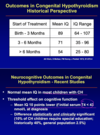Abnormal TSH in Infancy Flashcards
T/F: fetuses can make their own T4 after 6 weeks of development
false. Maternal T4 is the primary source of thyroid hormone
during the first 20 weeks fetal development
In utero, the TSH-FT4-FT3 feedback system is
immature, leading to relatively __) TSH ___ FT4
In utero, the TSH-FT4-FT3 feedback system is
immature, leading to relatively high TSH low FT4
T/F: you must alwasy treat transient confenital hypothyroidism in infancy to prevent brain damage
false. transient congenital hypothyroidism may not need
treatment – depend on expectation of natural history
and co-morbid conditions
__ __ is the most common
cause of preventable developmental delay
Congenital hypothyroidism is the most common
cause of preventable developmental delay
__ __ is the most common cause of
permanent congenital hypothyroidism
Thyroid dysgenesis is the most common cause of
permanent congenital hypothyroidism
not all instances of congential hypothyroidism may need treatmnet, but if it does need tx, you should start it within the ___ ___ of life. the treament should aim to normalize TSH in the infant by ___ month(s)
not all instances of congential hypothyroidism may need treatmnet, but if it does need tx, you should start it within the FIRST WEEK of life. the treament should aim to normalize TSH in the infant by 1 month(s)
note

Question
Most common cause of congenital hypothyroidism:
- Iodine deficiency
- Enzyme defect
- Agenesis of thyroid gland
- Lingual thyroid
- Maternal exposure to anti-thyroid medication
AGENESIS OF THYROID GLAND; poor formation.
outline: thyroid function is negatively regulated by:
T3 levels. or t4 levels (since it cleaves into T3)

Embryology of thyroid gland
Day 16-17: Developing
from pharyngeal floor
and paired lateral
anlagen from the __
__ pouch
• Day 50: fusion of the
median and lateral
anlagen, thyroid gland
migrated to its definitive
location in the ___
neck
Day 16-17: Developing
from pharyngeal floor
and paired lateral
anlagen from the fourth
pharyngeal pouch
• Day 50: fusion of the
median and lateral
anlagen, thyroid gland
migrated to its definitive
location in the anterior
neck
READ:
Thyroid Ontogenesis
Embryogenesis – first 10-12 weeks of
development
• Hypothalamic maturation – weeks 4-5 through
week 30-35 of development
• Maturation of thyroid system function – weeks 20
through term
Maturation of fetal thyroid system
T4 (and T3)
•Week 10: capable of iodide concentration
- Week 20: thyroid hormone production
- Week 30: increase in T3
•At birth: T3 and T4 increased 2-6x, peaked at 24-36 hours
Truth or false:
FT4 can cross placenta
true. a bit.

Congenital Hypothyroidism
• Overall incidence ≈ 1:4000 live births
– 85% Sporadic
– 15% Hereditary
• Clinical assessment detects ≤ 5% of cases
• Common cause of preventable cognitive
impairment• ∴Neonatal thyroid screening performed
routinely in most developed countries
What is the etiology of transient congenital hypothyroidism?
Transient (10%)
– Prematurity
– Transient primary hypothyroidism
– Maternal anti- thyroid drugs and iodine
– Maternal TSH blocking antibody
What is the etiology of persistent congenital hypothyroidism?
Persistent (90%)
– Thyroid dysgenesis
– Dyshormonogenesis
– Iodide deficiency
– Maternal I131 ablation
during pregnancy – Thyroid hormone
resistance – TSH deficiency
Transient Congenital Hypothyroidism of prematurity:
premature babies born at around 20-26 weeks then there will be a __ free T4 and ___ TSH. Indication of hypothyroidism

premature babies born at around 20-26 weeks then there will be a LOW free T4 and HIGH TSH. Indication of hypothyroidism














